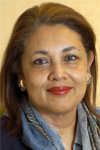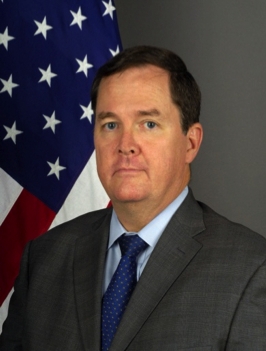The Foreign Policy Research Institute (FPRI) is an American think tank based in Philadelphia, Pennsylvania, that conducts research on geopolitics, international relations, and international security in the various regions of the world and on ethnic conflict, U.S. national security, terrorism, and on think tanks themselves. It publishes a quarterly journal, Orbis, and a series of monographs, books, and electronic newsletters.

Paul Henry Nitze was an American businessman and government official who served as United States Deputy Secretary of Defense, U.S. Secretary of the Navy, and Director of Policy Planning for the U.S. State Department. He is best known for being the principal author of NSC 68 and the co-founder of Team B. He helped shape U.S. Cold War defense policy over the course of numerous presidential administrations.

The Paul H. Nitze School of Advanced International Studies (SAIS) is a graduate school of Johns Hopkins University based in Washington, D.C. with campuses in Bologna, Italy and Nanjing, China.

Shirin R. Tahir-Kheli is an American political scientist who also served in the Department of State. In 2006, she was appointed as the first Ambassador for women's empowerment by the United States Secretary of State Condoleezza Rice as well as Senior Advisor to the Secretary of State on United Nations Reform. She was sworn in as the First American Muslim Ambassador in July 1990. Dr. Tahir-Kheli was the Special Assistant to the President and Senior Director for Democracy, Human Rights and International Operations at the White House National Security Council, from 2003-2005. She has served three Republican presidential administrations since 1980.
Robert L. Gallucci is an American academic and diplomat, who formerly worked as president of the John D. and Catherine T. MacArthur Foundation. He previously served as dean of the Edmund A. Walsh School of Foreign Service at Georgetown University, from 1996 to June 2009. Prior to his appointment in 1996, for over two decades he had served in various governmental and international agencies, including the Department of State and the United Nations.

David M. Lampton is the George and Sadie Hyman Professor and Director of China Studies Emeritus at the Johns Hopkins University's Paul H. Nitze School of Advanced International Studies (SAIS) and former Chairman of The Asia Foundation.

The School of International and Public Affairs (SIPA) is the international affairs and public policy school of Columbia University, a private Ivy League university located in Morningside Heights, Manhattan, New York City. SIPA offers Master of International Affairs (MIA) and Master of Public Administration (MPA) degrees in a range of fields, as well as the Executive MPA and PhD program in Sustainable Development.

Esther Diane Brimmer is an American foreign policy expert and former Assistant Secretary of State for International Organization Affairs. In June 2013, she left her post as Assistant Secretary and returned to academia.

The Elliott School of International Affairs is the professional school of international relations, foreign policy, and international development of the George Washington University, in Washington, D.C. It is highly ranked in international affairs and is the largest school of international relations in the United States.

James Braidy Steinberg is an American academic administrator and former diplomat, who served as the United States deputy secretary of state during the Obama administration. He has been the dean of the Paul H. Nitze School of Advanced International Studies (SAIS) at Johns Hopkins University since November 1, 2021. Previously he was a professor at the Maxwell School of Citizenship and Public Affairs at Syracuse University.
The Johns Hopkins University SAIS Europe in Bologna, Italy, is the European campus of the Paul H. Nitze School of Advanced International Studies (SAIS), a division of Johns Hopkins University located in Washington, D.C. SAIS Europe's degree programs emphasize international economics, international relations, European Union policy, and global risk with options to specialize in a broad range of other policy areas and geographic regions.

The Hopkins–Nanjing Center, formally the Johns Hopkins University–Nanjing University Center for Chinese and American Studies, is an international campus of the Paul H. Nitze School of Advanced International Studies and a joint educational venture between Johns Hopkins University and Nanjing University that opened in Nanjing, China, in 1986. Former Hopkins President Steven Muller and former NJU President Kuang Yaming worked together to create the center, recognizing the importance of improved understanding and relations between their respective countries. Muller believed China to be "the country of the future."
Matthew Levitt is an American political scientist. He is an expert in Hamas.
The Central Asia-Caucasus Institute or CACI was founded in 1996 by S. Frederick Starr, a research professor at Johns Hopkins University's School of Advanced International Studies. He has served as vice president of Tulane University and as president of Oberlin College (1983–1994) and the Aspen Institute. He has advised three U.S. presidents on Russian/Eurasian affairs and chaired an external advisory panel on U.S. government-sponsored research on the region, organized and co-authored the first strategic assessment of Central Asia, the Caucasus and Afghanistan for the Joint Chiefs of Staff in 1999, and was involved in the drafting of recent U.S. legislation affecting the region.
Afshin Molavi is an Iranian-American author and expert on global geopolitical risk and geo-economics, particularly the Middle East and Asia. He is co-director of the Emerge 85 Lab, a joint research initiative between the Johns Hopkins Foreign Policy Institute and UAE-based Delma Institute. He is a senior research fellow at both the New America Foundation and Johns Hopkins University Paul H. Nitze School of Advanced International Studies, as well as a senior advisor at Oxford Analytica. At New America, he is co-director of the World Economy Roundtable, an exercise to remap the global economy in the wake of The Great Recession.

Shamila N. Chaudhary is an American foreign policy expert and academic who is the Senior South Asia Fellow at New America and senior advisor to Dean Vali Nasr at the Johns Hopkins University School of Advanced International Studies. She specializes in U.S. counterterrorism and national security issues, U.S.-Pakistan relations, Pakistan internal politics, and regional issues in South Asia.

Thomas O. Melia currently serves as Washington director at PEN America. Previously, he served in the Obama Administration as USAID's Assistant Administrator for Europe and Eurasia (2015–2017) and as Deputy Assistant Secretary of State in the Bureau of Democracy, Human Rights, and Labor at the United States Department of State (2010–2015). Melia also served as Executive Director of Democracy International, an organization that designs, implements, and evaluates democracy and governance programs around the world. Additionally, he was the Deputy Executive Director of Freedom House, a human rights organization.
The International Peace and Security Institute or IPSI is a division of Creative Learning an international nonprofit organization with 501(c)(3) status headquartered in Washington, D.C. Founded in 2009, IPSI was acquired by Creative Learning in November 2016. The Institute's objective is to train young peacebuilding and International Justice leaders in the skills needed to effectively intervene in violent conflict scenarios in pursuit of sustainable peace.
emerge85, originally known as The Johns Hopkins SAIS-Delma Institute Partnership on Geo-Economic Multiplicity, is a research partnership between the Foreign Policy Institute at Johns Hopkins Paul H. Nitze School of Advanced International Studies (SAIS) and the UAE-based Delma Institute. The partnership is co-located in Washington, D.C., and Abu Dhabi.
Andrew Mertha is an American political scientist and the Inaugural Director of the SAIS China Global Research Center at Paul H. Nitze School of Advanced International Studies (SAIS) of Johns Hopkins University. He is a scholar of Chinese and Cambodian politics with a particular emphasis on bureaucracy, institutions, Leninist Party Systems, policymaking and implementation, and China–United States relations. Mertha speaks Khmer, Mandarin, French, and Hungarian. He is one of few American scholars on China-Cambodia relations due to his proficiency in Khmer.












